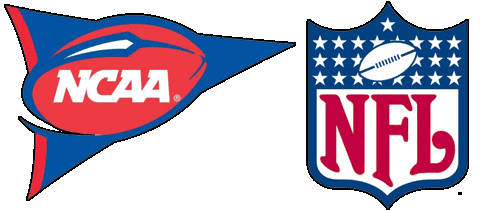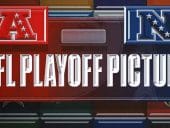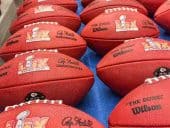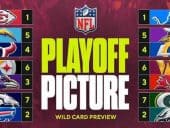NFL vs. College Football Betting Differences
- NFL matchups are more balanced, with fewer blowouts and more competitive betting lines.
- In 2017, college favorites won 75% of games straight up but only covered the spread 48.25% of the time.
- NFL favorites won 60% straight up and covered the spread 54.55% of the time, showing tighter line efficiency.

Football is the most bet-on sport in the United States and has existed since Rutgers beat New Jersey (now Princeton) by a score of 6-4 on November 6, 1869.
Even though football got its start on college campuses, and the National Football League wasn’t founded until August 20, 1920, today – at first glance – the two levels of football appear the same: Both wear and use similar equipment, have similar rules with some minor exceptions, and play games in stadiums with thousands of fans in the stands.
However, there are some significant differences to know before placing a bet on NFL or college football games. These differences affect the odds, lines, and payouts of both college and professional football, so it’s vital information that could determine whether your wager is won or lost.
So, what are the differences?
Betting On NFL Or College Football Games
No, the Alabama Crimson Tide Can’t Beat the Cleveland Browns
The biggest overall difference between the NFL and college football is simple: The NFL is a job, and college football is a school-sponsored sport. Players on NFL teams are full-grown adults who practice and study film for 10 to 14 hours a day each week, while college football teams, which are comprised of teenagers and young adults, can only commit, at most, roughly half that time due to college classes and other commitments.
But how does this affect betting on the NFL or college football? Well, as the saying goes, “practice makes perfect,” and having less time to prepare for an opponent means teams are more likely to make mistakes in crucial situations. This makes sloppy play more common and the outcomes of college football games more unpredictable.
Simply put, a college football team isn’t as good at playing football as a professional team.
Limitless vs. Finite Rosters
Mo’ College Football Players = Mo’ Problems
Further complicating college football betting is the sheer number of players and possibilities needed to be predicted correctly to ensure a winning bet. Eliminating unlikely outcomes is the biggest challenge professional bettors face and the biggest problem they must solve before placing a wager.
The NFL has 32 teams, and each team can have a maximum of 53 players. This means 1,696 NFL players are eligible to play each week. However, only 45 of the 53 players can be active for a game, meaning 1,440 players suit up before kickoff each week.
In contrast, NCAA Division I FBS Football currently has 128 teams; each team can have a maximum of 85 scholarship players in addition to 20 walk-ons for 105 players. This doesn’t include the fact that teams often add more than 105 during the season since the rules only limit roster size at the beginning and end of each season.
But if we ignore that, and you only consider the 105 players, it means each week, roughly 13,440 players are on college football rosters, nearly eight times the amount of NFL players. The number of factors in play on every play with this amount of players would make it difficult for any mathematician – let alone your average college football bettor – to make an educated choice on who to bet on.
Heavy Favorites In The NFL vs. NCAAF
Good in Head-to-Head but Bad Against the Spread
Because there is such a larger number of players at the college level when compared to the NFL, it means there is also a larger skill gap as well. It’s common to see point spreads of -20, -30 or even -40 in college football, but in the NFL, if the spread is -7 then the team is considered heavy favorites.
This is due to the wider gaps in talent among college football teams since the top 25 teams regularly schedule bottom-tier Division I FBS – and sometimes FCS – opponents as warm-up games. Will the Alabama beat Charleston Southern? Almost certainly. Will they beat them by at least 50 points? Maybe, but it’s a lot less likely.
There are no warm-up games in the NFL, and every opponent has a reasonable chance to beat your team, but what about when it comes to betting?
During 2017, college football teams picked as the favorites won roughly 75% of their games when compared to the NFL, where only 60% won their head-to-head matchups. Here is how both levels of football faired against the spread at football betting sites during the 2017 season:
- NFL: Favorites ATS 54.55% – Underdogs ATS 45.45%
- CFB: Favorites ATS 48.25% – Underdogs ATS 51.75%
Player Retention Leads To Familiarity
Known vs. Unknown Quantities
When betting on college football teams, it’s harder to measure how a team will perform from one year to the next. In college football, each player has four years of eligibility, and after that, they are no longer allowed to compete at the collegiate level.
Even if a team is good one season, it doesn’t mean they will be good the following season, which often leads to myriads of disappointed fans and huge losses at sportsbooks simply due to the “revolving door” business that is college football.
While the NFL has a similar roster turnover rate, it does offer opportunities to the best players to make longer commitments to teams.
So, if a team is good one year, they are much more likely to be good the next season compared to a college team because of the ability to keep good players on the roster. On average, this makes sports betting on an NFL team a safer bet each season.
Narrow vs. Wide Focus
Heavy NFL Action and Obscure College Football Lines
In addition to the talent level being closer in the NFL, the betting lines are also closer due to more “action” on each individual matchup.
When more money comes in on one of the two teams in the NFL matchup, the line will change as sportsbooks want to keep the amount of money placed on both sides as equal as possible to ensure a profit.
For example, NFL lines that start at -7 could drop by half to, say, -3.5 at game time, making the margin of error when picking a team much smaller.
However, college football does have one thing in its favor: The obscure betting lines where sportsbooks and the public are unlikely to pay too much attention. Sure, matchups between top 10 teams or top-tier in-conference matchups will have large amounts of money wagered on them, but looking outside the Power Four Conferences, you may find bettors soft lines, lines with good value, between smaller schools.
Sportsbooks are less likely to put much effort into changing the lines of games that aren’t getting as much betting action. These are lines professional bettors with vast college football knowledge will like to take advantage of and are ones you might consider looking into if you consider yourself knowledgeable of collegiate football.
Making An Informed Bet
Knowledge is Betting Power If You Can Find It
Another reason the NFL is more bet on is the constant stream of news and reports regarding injuries and player performance. NFL teams are also required to submit injury reports. As soon as sportsbooks have this knowledge, the public does as well, making it easier to react to adjustments on a set of odds or point spreads.
On the other hand, in college football, it is a lot harder to get information on essential factors such as injuries or which players will start in an upcoming game. Injury reports aren’t mandatory until kickoff, but the information isn’t valuable to bettors at that point.
Often, the facts will come from unknown sources who have inside information on the team. Sportsbooks usually won’t budge on this information unless they have an inside source, but if you act on it, then do it at your own risk since it’s information that didn’t come from the horse’s mouth.
Conclusion
Betting on NFL vs. CFB Finale
Wagering on the NFL and college football are two different levels of playing football and, in turn, require two different levels of thinking when betting on America’s game. The NFL is more streamlined and well-known, and overall, it is a safer bet in most wagers placed.
College football is much harder to predict, has less information overall, and has a specific chaotic nature that can lead to bigger payouts since if it's hard for you to expect, then it's equally as hard to a sportsbook.
The choice is ultimately yours to bet on, but regardless, the goal here is to win the football wager, and being more informed about the NFL and college football is a giant step in achieving that goal.
With just two weeks left in the 2025 NFL regular season, the playoff picture is rapidly coming into focus, with only four postseason spots remaining up for grabs. The NFC East is the only division officially clinched, with Philadelphia locking … Read more
This Sunday, the Philadelphia Eagles face the Kansas City Chiefs in Super Bowl LIX (59). The Eagles seek revenge for their Super Bowl 57 loss, while the Chiefs aim to be the first NFL team to win three consecutive Super … Read more
The NFL postseason has arrived, and the betting odds for Wild Card Weekend have been released. Fourteen teams have qualified for the playoffs, with the Detroit Lions and the Kansas City Chiefs earning a bye this weekend. The Lions could … Read more



